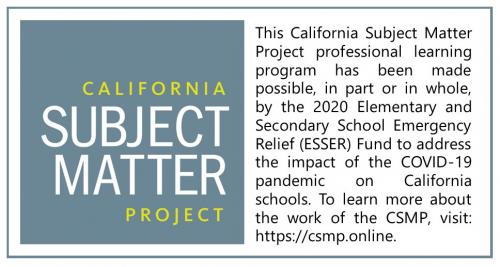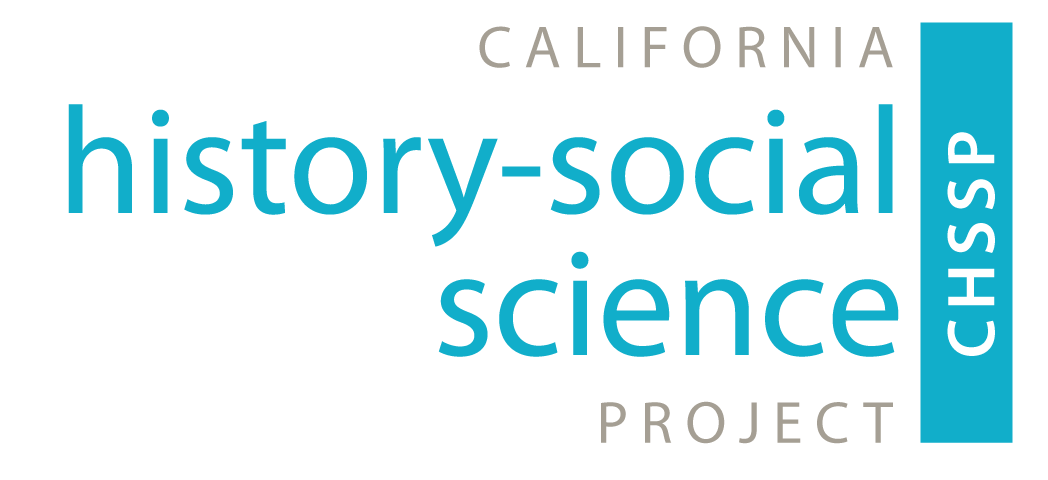
Grade Groups is a CHSSP-led program that brings together grade-level specific cohorts of TK-12th grade educators from around the state to collaborate on best teaching practices.
This page provides information about Grade Group leaders and support. For information about scheduling and becoming a Grade Groups Fellow, see our events page.
Grade TK-3
- Leaders: Kate Bowen (kbowen@ucdavis.edu), Katharine Cortes (kcortes@ucdavis.edu), Beth Slutsky (bsslutsky@ucdavis.edu)
- What to expect: The TK-3rd Grade Group looks forward to addressing how to integrate the following topics into their classrooms: communities, families, geography, economics, Indigenous peoples, and civic engagement. There will be opportunities to plan within and across grade levels and subject areas, with a special emphasis on incorporating picture books.
Grade 4
- Leaders: Shelley Brooks (shebrooks@ucdavis.edu) and Stella Nagac D'Arceaux
- What to expect: Using primary sources and an inquiry-based instructional approach, the fourth grade group will explore content such as immigration and migration history, the Indigenous experience, and the environmental impact of California’s growth throughout the nineteenth and twentieth centuries.
Grade 5
- Leaders: Kate Bowen (kbowen@ucdavis.edu) and Linda Biewer-Elstob (lbiewer@djusd.net)
- What to expect: Teacher Fellows in the 5th Grade Group will implement the HSS Framework utilizing lessons, primary sources, inquiry, historical thinking strategies, and literacy support; integrate history content with English Language Arts skills; learn about the FAIR Act, Social Justice, Environmental Literacy, and anti-biased pedagogy/curriculum in the 5th grade classroom; and collaborate and share resources with other 5th grade teachers.
Grade 6
- Leader: Shennan Hutton (slhutton@ucdavis.edu)
- What to expect: The Grade 6 Group will work on building an effective inquiry-based curriculum and meeting the challenges of another unusual year with students at different levels. While we will pay special attention to questions of inequality and justice, each session will focus on content connected to the Framework and developing inquiry skills through multiple primary sources, activities, and strategies. We will focus on new material and a new set of framework questions and content areas.
Grade 7
- Leader: Shennan Hutton (slhutton@ucdavis.edu)
- What to expect: The Grade 7 Group will work on building an effective inquiry-based curriculum and meeting the challenges of another unusual year with students at different levels. While we will pay special attention to questions of injustice, resistance and resilience, each session will focus on content connected to the Framework and developing inquiry skills through multiple primary sources, activities, and strategies. We will focus on new material and a new set of framework questions and content areas.
Grade 8
- Leaders: Katharine Cortes (kcortes@ucdavis.edu) and Amparo Chavez-Gonzalez (amps729@g.ucla.edu)
- What to expect: The 8th grade group will continue its focus on reimagining how we tell the history of the 19th century. We will focus on implementing new scholarship, identifying counter narratives, and bringing more California history into the classroom.
Grade 10
- Leaders: Nicole Gilbertson, Devin Hess, Philip Ninomiya
- What to expect: How do we get to the world we have today and how do we make it better? Starting with a contemporary problem and encouraging teachers to incorporate and focus on the latter half of the 20th century, teachers will design units that backwards map to empower students to understand and act towards a more just world. Themes we will cover include: globalization, movements for independence, and energy use. Teachers will lead students through a study of these regions ending with an action plan for change.
Grade 11
- Leaders: Shelley Brooks (shebrooks@ucdavis.edu) and Beth Slutsky (bsslutsky@ucdavis.edu)
- What to expect: The 11th Grade Group will feature content talks and model lesson plans on the following topics that can be woven into 20th and 21st-century history courses: disability history (as part of implementing the FAIR Act), Indigenous history, Environmental History, Popular Culture, Cultural Nationalism, and teaching about the post-2001 era.
Grade 12 Government
- Leader: Stacey Greer (sbgreer@ucdavis.edu) and Stephanie Cook
- What to expect: This series looks to engage the question of what an anti-racist government course looks like while supporting students to engage civically in their local communities on issues of their concern. The sessions will combine presentations and discussions with scholars as well as offer ideas for classroom application. We wish to make this series responsive to teacher needs, so participants will contribute to the selection of topics and focus for the series.
Ethnic Studies (TK-12th grade)
- Leaders: Cindy Mata (cmata@gseis.ucla.edu) and Amparo Chavez-Gonzalez (amps729@g.ucla.edu)
- What to expect: This year, the Ethnic Studies Grade Group members will explore the concepts of systems of oppression, identity, intersectionality, resistance, and how to develop an ethnic studies course that is action oriented. We are excited to build on the work started last year. We look forward to engaging in collaborative conversations and provide targeted support for educators at different stages in their learning with ethnic studies. This series is intended for the development of both stand-alone courses or infusing an ethnic studies lens to existing classrooms.

